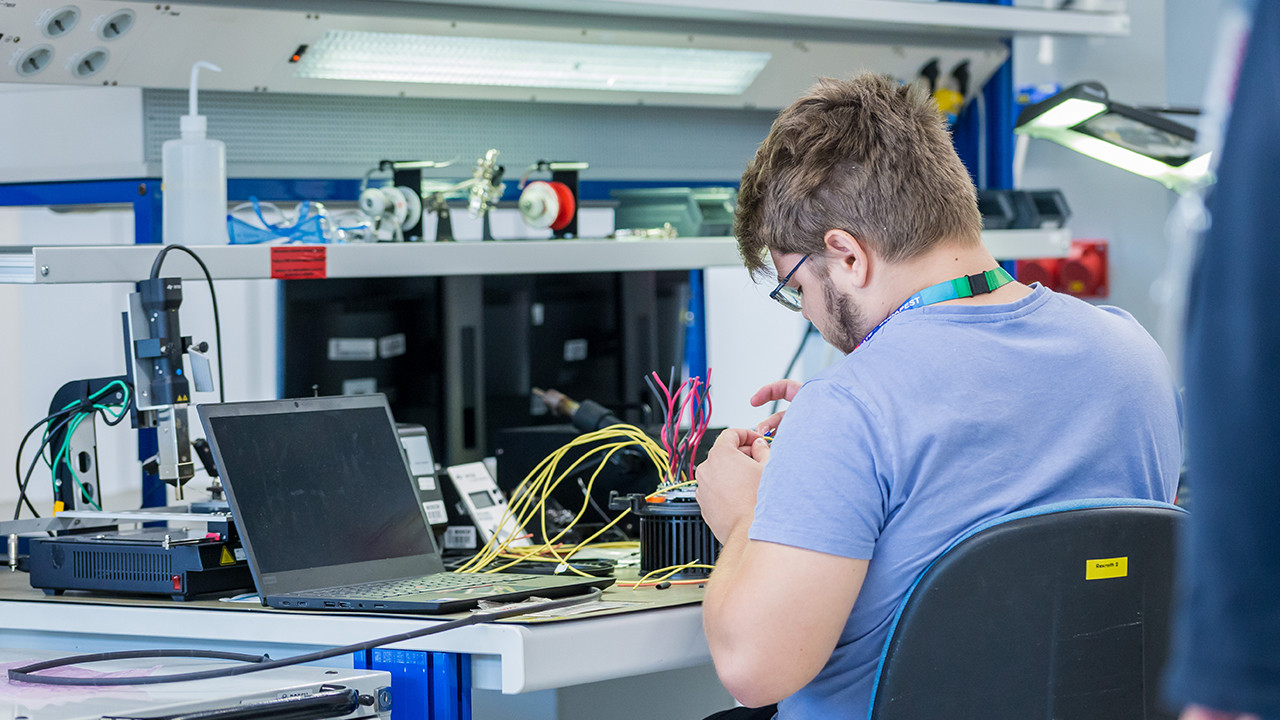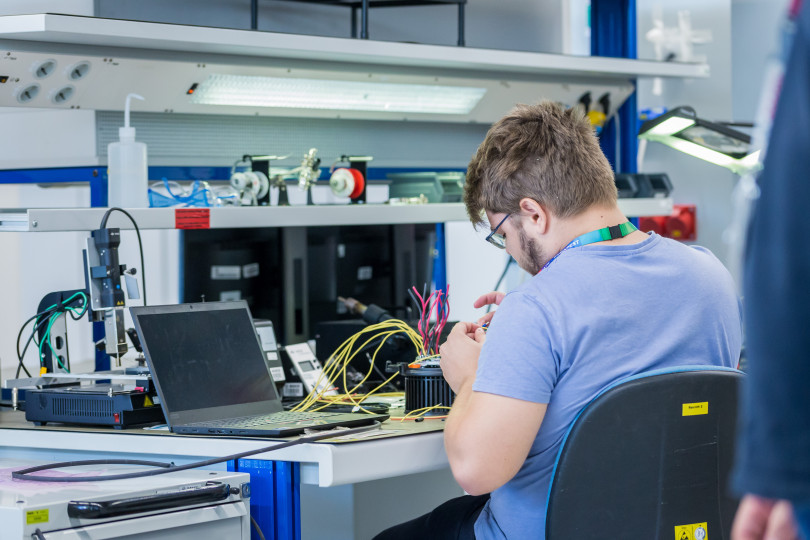Research and development, education, education development, the development of bidirectional educational programs, talent development, the creation of joint research groups and joint participation in tenders – these are some of the areas in which the relationship between University of Pécs Faculty of Engineering and Information Technology (PTE MIK) and the Bosch Group in Hungary will be strengthened thanks to a recently signed cooperation agreement. The cooperation between the university and the company group is not new, for example the testing of driver assistance systems in 3D virtual environments, the use of 3D metal printing in the automotive industry, the evaluation of laboratory measurements and the application of AI solutions have been part of previous joint projects. The henceforth even closer partnership with its start-up approach offers new opportunities for both parties.
Based on the cooperation agreement signed at the MIK PARTNERS Professional Day, the two parties will strengthen their relationship primarily in the fields of mechanical engineering, electrical engineering and IT, with the Bosch Group hosting students from the University of Pécs (PTE) for internships, among others. A particular focus will be on joint work on research and development projects, the scientific activities of students and their proposals, as well as the continuous professional training of Bosch associates. With the support of the large corporation, PTE has also developed a recognition and incentive program for its exceptionally talented students and outstanding teachers and researchers, in recognition of their excellent academic, teaching and research achievements, as well as their exceptional performance in academic competitions and tenders, some of which are already available to students and mentors.
“Tradition is important to us, even the company founder Robert Bosch supported universities in the Stuttgart area in his time, and when the company was established in Hungary in the late 1990s, cooperation with secondary schools and universities was a priority. Even today, we still think that we cannot solve everything by ourselves, and that to be successful, we need different perspectives and to strengthen our ecosystem. It is the added value of cooperation that gives us the strength to approach things from a scientific perspective rather than through our industry-focused glasses. The trio of education, research and innovation is particularly important for us, and the trends in the automotive industry make it even more important to accelerate innovation. By involving our academic partners, we can be faster, more flexible and better, which is essential in today’s world,” says András Kemler, head of real estate management of the Bosch Group in Hungary and the Adriatic region. In the future, the cooperation between the two parties could be expanded to include projects in automation, testing and non-destructive material testing, among others.
It is also in the interest of the national economy, industry and higher education to recognize the real needs of industry and to ensure that all actors speak the same language. “For us, the approach we take to our university relations is very important: we do not give the institution a task but always create cooperation by building a joint team. In this, it is essential that the work of the members is not determined by who represents which side. The Bosch Group is fundamentally an ecosystem thinker, even if in this case we are talking about bilateral cooperations. There is always a start-up approach to cooperation, because we would like to see products at the end of the R&D process. PTE MIK is integrated in the South Hungarian region, it is connected to small and big companies, and we would like to be part of this ecosystem. This is a long-term plan, for which we need to find the partners and the openness that Bosch also represents,” adds András Kemler.
“For PTE MIK, partnerships like the one with the Bosch Group are also of utmost importance because they enhance and hallmark us. We were delighted when Bosch approached our faculty, and now the Hungarian company is led by young colleagues who know and understand the local business environment. Together, we are launching a complex program to support excellence that will enhance the role, place and value of not just the students but also of faculty mentors. It is important for us to ensure that industry-led student project work produces meaningful outcomes in academic higher education. Our experience is that an academic student research project in such a supported context is more likely to receive national attention than one without, and we are therefore seizing the opportunities offered by industry, including the Bosch Group. We have now taken a previous excellent relationship to a new level, as Bosch is a long-standing partner and exhibitor, whether at the Pollack Expo or the MIK PARTNERS Professional Day. We welcome our partner’s efforts to build a knowledgeable professional community in our region as well. I think we all stand to gain from this cooperation,” says Dr. Gabriella Medvegy, dean of the PTE MIK, summing up the essence of the link with the Bosch Group on behalf of the faculty.
Zita Hella Varga
Phone: +36 70 667-6374
Bosch has been present in Hungary since 1898 with its products. After its re-establishment as a regional trading company in 1991, Bosch has grown into one of Hungary’s largest foreign industrial employers with currently eight subsidiaries. In fiscal 2023 it had total net sales of 2.207 billion forints and consolidated sales to third parties on the Hungarian market of 343 billion forints. The Bosch Group in Hungary employs more than 18,300 associates (as of December 31, 2023). In addition to its manufacturing, commercial and development business, Bosch has a network of sales and service operations that covers the entire country.
The Bosch Group is a leading global supplier of technology and services. It employs roughly 429,000 associates worldwide (as of December 31, 2023). The company generated sales of 91.6 billion euros in 2023. Its operations are divided into four business sectors: Mobility, Industrial Technology, Consumer Goods, and Energy and Building Technology. With its business activities, the company aims to use technology to help shape universal trends such as automation, electrification, digitalization, connectivity, and an orientation to sustainability. In this context, Bosch’s broad diversification across regions and industries strengthens its innovativeness and robustness. Bosch uses its proven expertise in sensor technology, software, and services to offer customers cross-domain solutions from a single source. It also applies its expertise in connectivity and artificial intelligence in order to develop and manufacture user-friendly, sustainable products. With technology that is “Invented for life,” Bosch wants to help improve quality of life and conserve natural resources. The Bosch Group comprises Robert Bosch GmbH and its roughly 470 subsidiary and regional companies in over 60 countries. Including sales and service partners, Bosch’s global manufacturing, engineering, and sales network covers nearly every country in the world. Bosch’s innovative strength is key to the company’s further development. At 136 locations across the globe, Bosch employs some 90,000 associates in research and development, of which nearly 48,000 are software engineers.
The company was set up in Stuttgart in 1886 by Robert Bosch (1861–1942) as “Workshop for Precision Mechanics and Electrical Engineering.” The special ownership structure of Robert Bosch GmbH guarantees the entrepreneurial freedom of the Bosch Group, making it possible for the company to plan over the long term and to undertake significant upfront investments in the safeguarding of its future. Ninety-four percent of the share capital of Robert Bosch GmbH is held by Robert Bosch Stiftung GmbH, a charitable foundation. The remaining shares are held by Robert Bosch GmbH and by a corporation owned by the Bosch family. The majority of voting rights are held by Robert Bosch Industrietreuhand KG. It is entrusted with the task of safeguarding the company’s long-term existence and in particular its financial independence – in line with the mission handed down in the will of the company’s founder, Robert Bosch.
Additional information is available online at www.bosch.hu, iot.boschblog.hu, www.bosch.com, www.iot.bosch.com, www.bosch-press.com, www.twitter.com/BoschPresse



